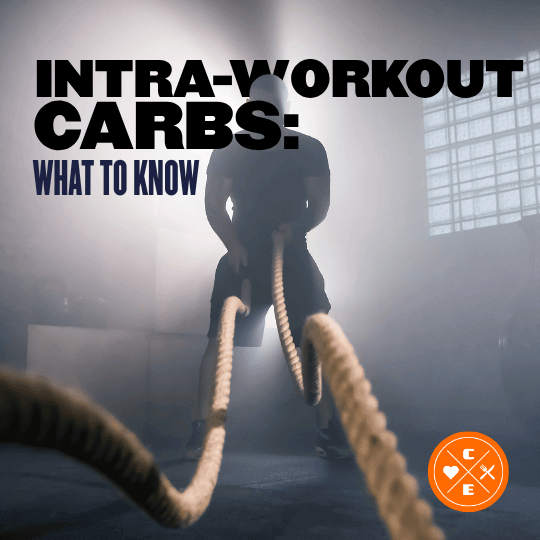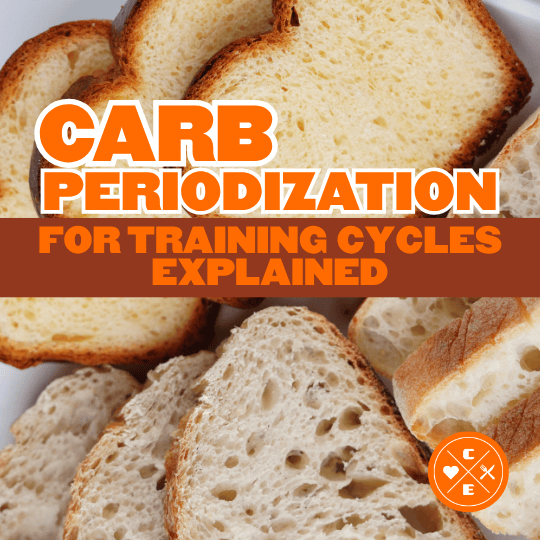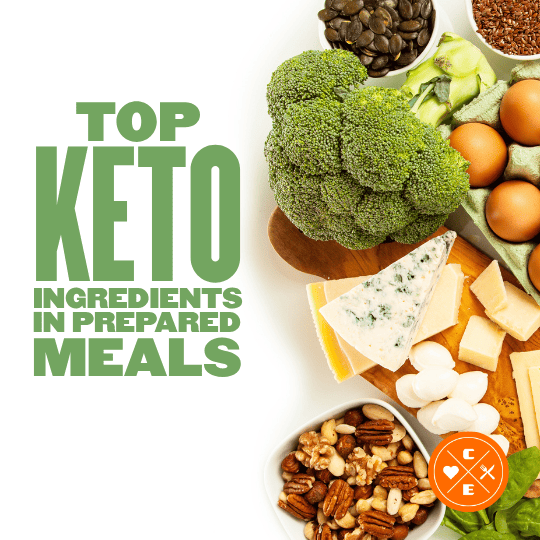
Intra-Workout Carbs: What to Know
Jason Nista
Nutrition
|
Exercises & Fitness
16 minute read
Table of Contents
When you're working out for over an hour, your body may run low on glycogen, the main energy source for your muscles. That's where intra-workout carbs come in. These are fast-digesting carbs - like sports drinks or gels - that help keep your energy steady, delay fatigue, and even improve mental focus during longer or more intense sessions. Here's what you need to know:
- What they are: Simple carbs consumed during exercise to keep glycogen levels stable.
- Why they matter: They prevent energy crashes, reduce muscle breakdown, and improve endurance.
- How much to take: For workouts lasting 1–2 hours, aim for 30–60g of carbs per hour. For sessions over 2 hours, increase to 60–90g per hour.
- When to use them: Best for high-intensity or endurance workouts over 60 minutes. Skip them for shorter or low-intensity sessions.
- Sources: Liquid carbs (sports drinks), gels, or powders like cyclic dextrin are easy to digest and quick to absorb.
Start small, test your tolerance during training, and stick to familiar products to avoid stomach issues. For shorter workouts or if you've eaten well beforehand, you likely don’t need them.
The Best Intra-Workout Foods & Drinks
How Intra-Workout Carbs Improve Performance
Intra-workout carbohydrates play a key role in keeping energy levels steady and maintaining focus during exercise. These fast-digesting carbs work by replenishing energy stores and supporting both physical and mental performance throughout your workout.
Energy Supply and Glycogen Replacement
As you exercise, your muscles burn through glycogen, the stored form of carbohydrates. Supplementing with intra-workout carbs helps replenish this supply, providing glucose for energy - especially crucial during long or intense sessions. Matching your carb intake to the intensity and duration of your workout can make a noticeable difference.
Research backs this up: consuming 22 grams of carbs per hour has been shown to improve performance more effectively than 11 grams per hour. Another study found that taking 16 grams of glucose per hour boosted endurance capacity by 14% compared to drinking water alone.
For workouts lasting 1–3 hours, aim for 30–60 grams of carbs per hour. If you're exercising for more than 3 hours, increase that to 60–90 grams per hour, ideally through an isotonic drink for easier digestion. Studies also show that during prolonged exercise lasting over 2 hours, carbohydrate intake helps maintain high rates of carbohydrate oxidation, significantly enhancing endurance compared to a placebo.
Effects on Endurance and Recovery
Intra-workout carbs do more than just fuel your performance - they also help delay fatigue and support recovery between training sets. By maintaining blood glucose levels, they keep energy pathways active, allowing you to sustain intensity for longer periods. Research suggests that carbohydrate supplementation during exercise can delay fatigue by 30–60 minutes.
For example, in a study involving cyclists, those who consumed a glucose drink during a 2-hour session at 54% VO₂max improved their power output by 9% (254 watts vs. 231 watts). When they switched to a glucose-fructose mix, their power output increased by an additional 8%, reaching 275 watts. Another study highlighted that combining a pre-exercise meal with intra-workout carbs extended time-to-exhaustion by 12% compared to pre-exercise fueling alone - and by 22% compared to a placebo.
Carbohydrates also help protect your muscles from being broken down for energy. During workouts lasting 3–4 hours, consuming carbs ensures that blood glucose becomes the primary energy source, sparing muscle glycogen. This not only boosts performance but also aids in recovery and reduces post-workout soreness.
Mental and Physical Benefits
Carbs aren't just for your muscles - they're fuel for your brain too. Consuming carbohydrates mid-workout helps maintain mental focus, which is essential for executing proper technique and making quick decisions during high-intensity or prolonged sessions.
Timing your carb intake can further enhance these benefits. For a 60-minute workout, consuming 20–30 grams of carbs midway through can keep your energy and focus sharp. In a 2-hour session, try splitting your intake - about 30 grams halfway through each hour. This strategy not only supports physical endurance but also helps you stay mentally sharp, enabling you to gauge your effort and stay motivated during tough segments.
When to Use Intra-Workout Carbs
Timing your carb intake can make a big difference in workout performance. Whether or not you should include carbs during your workout depends on how long and intense your session is, as well as your overall training goals. Let’s break it down.
Best Times to Use Them
Intra-workout carbs are especially helpful during high-intensity sessions lasting over 60 minutes or endurance-based activities like cycling, swimming, or long-distance running. Research indicates that after 90–120 minutes of intense activity, glycogen stores are likely to be depleted enough to impact performance significantly. Endurance athletes, in particular, face a greater risk of running out of glycogen during prolonged workouts.
"When you're tackling longer and more intense workouts, especially those that stretch beyond the one-hour mark, adding some intra-workout carbs to your routine can be a real game-changer." - West Coast Iron
For workouts that last between 1–2 hours, consuming 30–60 grams of simple carbs per hour can help you sustain energy and delay fatigue. High-intensity, anaerobic exercises like heavy lifting, CrossFit, or intense circuit training also increase carbohydrate demands as the intensity and duration ramp up.
Morning workouts, particularly those done on an empty stomach, can also benefit from fast-digesting carbs. If you struggle to perform well without a pre-workout meal, sipping on a carb source during your session might help.
On the flip side, not every workout calls for intra-workout carbs.
When You Don't Need Them
If your workout is under 60 minutes and you’ve fueled adequately beforehand, you likely won’t need intra-workout carbs.
For low-intensity activities like a leisurely yoga session, walking, or light resistance training, your body can typically rely on pre-existing energy stores. A good pre-workout meal should provide all the fuel you need for these types of exercises.
Personal Factors to Consider
Your decision to use intra-workout carbs also depends on a few personal factors:
- Training goals: If you're exercising for over two hours, you might need a higher intake - around 60 to 90 grams of carbs per hour - to keep your energy up. Endurance athletes have different carb needs compared to those focusing on short, intense sessions.
- Fitness level: Seasoned athletes may use fuel more efficiently and might not need intra-workout carbs during moderate-intensity efforts. Beginners, however, may benefit from additional carbs sooner.
- Daily carb intake: If your workouts are under 90 minutes and you’re already eating enough carbs throughout the day to replenish glycogen, you probably don’t need extra carbs during exercise.
- Digestive tolerance: Everyone’s stomach handles carbs differently. While some can easily process higher amounts, others may experience discomfort with even small doses. Start with smaller quantities and adjust based on how your body reacts.
sbb-itb-1989a25
Picking the Right Intra-Workout Carb Source
Selecting the right carbohydrate source can make a big difference in your workout performance. The key is to choose carbs that digest quickly, deliver fast energy, and are easy on your stomach.
Fast-Absorbing Carb Options
Simple carbohydrates are a go-to choice for intra-workout fueling. They break down quickly into glucose, providing a rapid energy boost, and their low fiber and fat content makes them easy to digest.
"Fast-digesting carbs cause a quick rise in blood sugar, making them ideal when energy is needed immediately." - Kristy Baumann, RD, Registered Dietitian and Founder of Marathon Nutritionist
Liquid carbs, like sports drinks, are particularly effective because they’re absorbed quickly. Amy Goodson, RD, a Sports Dietitian, explains:
"The point of a sports drink is to have simple sugars for energy"
Jessica Migala, writing for a Peloton blog in January 2025, shared that Kristy Baumann recommends options like white bread, sports drinks, and energy gels for their fast-digesting properties.
For those who want something neutral, cyclic dextrin is a flavorless carbohydrate powder that mixes easily with water.
If you're in a time crunch, Kirbie Daily, RDN, Sports Dietitian for the University of Memphis Athletics, suggests:
"If a workout is starting in five to 10 minutes and you're in a pinch, I like to recommend a spoonful of honey. It will be absorbed super quick to provide energy without making you feel weighed down"
Once you’ve chosen your carb source, the next step is figuring out how much to consume and when for maximum benefit.
How Much and When to Take
Getting the right amount of carbs at the right time is crucial for keeping your energy levels steady. Your carb needs depend on factors like workout intensity, duration, and how well your gut can handle them. Interestingly, body size doesn’t play a huge role here - what matters most is how much your gut can absorb.
For workouts lasting 1–2 hours at a moderate to intense pace, aim for 30–60 grams of carbs per hour. This matches guidelines from the American College of Sports Medicine.
If your session is more intense and goes beyond 2 hours, you might need 60–90 grams per hour. Some athletes can even handle 60–70 grams depending on the intensity level. For ultra-endurance events lasting over 6 hours, a mix of carbs, fats, and proteins is recommended.
Timing matters, too. For a 60-minute workout, try taking 20–30 grams of carbs about halfway through. If you’re exercising for closer to 2 hours, consider splitting your intake into two doses during the session. Start with liquid carbs for shorter sessions and adjust amounts for longer workouts based on how your gut responds.
"The key is how much your gut can absorb"
Training your gut to handle more carbs over time can improve your tolerance, boost endurance, and reduce chances of stomach discomfort.
How to Add Them to Your Routine
Once you’ve nailed down the right carb amounts, it’s all about consistency. Start fueling early in your workout, keep it steady, and stick to familiar carb sources - like drinks or gels - paired with proper hydration.
Always practice your nutrition plan during training to avoid surprises. Trying out new carb sources on race day or during an important session is a recipe for disaster. Opt for easily digestible options that are low in fat, fiber, and protein to keep things simple.
"It is about getting the right amount of carbs in a format that works for you"
And remember:
"Everyone's tolerance for what they can eat and when will be different because nutrition is so individualized"
Take the time to experiment during your training to find what works best for you.
Possible Problems and How to Avoid Them
Once you've set up your fueling strategy, it's important to recognize potential challenges that could derail your efforts. While intra-workout carbs can be a game-changer for performance, misjudging your approach can backfire.
Common Problems with Intra-Workout Carbs
Digestive troubles are a frequent complaint among endurance athletes, with 30%–90% reporting issues when using intra-workout carbs. Taking in too many carbs can overwhelm your digestive system, leading to nausea, gas, stomach discomfort, and side stitches. Research has even linked higher carb intake with increased nausea (r = 0.34) and flatulence (r = 0.35). Hypertonic carbohydrate solutions, which pull water into the intestines, can also contribute to gastrointestinal distress.
Since tolerance varies from person to person, it's essential to tailor your intake to what your body can handle. For workouts lasting less than an hour, especially if you've fueled properly beforehand, additional carbs are usually unnecessary.
Solid carb sources, like bars, tend to make you feel fuller than liquids or gels. If you're prone to digestive issues, stick to liquid or gel-based options.
How to Check Your Tolerance
Finding your personal carb tolerance takes some trial and error. Pay attention to your energy levels, digestion, and performance as you test different fueling methods. Start with small amounts and gradually increase your intake to see how your body responds.
Practice your fueling strategy during training sessions to avoid surprises on race day. This not only helps you sidestep digestive problems but also ensures you’re maximizing the benefits of your chosen carb source. Be mindful of the concentration of your drinks - solutions with an osmolality above 500 mOsm/kg H₂O are more likely to cause issues during exercise.
Staying hydrated can also help reduce the risk of digestive discomfort. By testing and refining your approach, you can strike the right balance between performance and comfort.
Pros vs. Cons: Quick Comparison
| Aspect | Pros | Cons |
|---|---|---|
| Performance | Sustains energy for workouts over 60 minutes; glucose-fructose blends improve endurance by ~8% | Not needed for sessions under 60 minutes |
| Digestive Impact | Multi-transport carbs (glucose + fructose) reduce GI issues; liquids are easier to digest | 30–90% of athletes report GI problems; solid carbs may cause fullness |
| Practical Use | Sports drinks (5–8% carbs) are simple to use and allow flexible dosing | Requires trial and error to find the right amount (ranges from 6–136 g/hour for individuals) |
| Cost & Convenience | Easy-to-find options make fueling accessible | Can add to expenses and require extra planning |
To get the most out of intra-workout carbs, practice is key. Stick to a 5–8% carb concentration for drinks, match your intake to your workout's intensity and duration, and build your tolerance slowly. For shorter sessions, they’re usually unnecessary, but for longer efforts, start small and adjust as needed.
Breaking your intake into smaller, frequent servings can make digestion easier and fine-tuning simpler. Additionally, cutting back on high-fiber foods 1–3 days before key workouts can help prevent digestive issues.
Conclusion: Main Points About Intra-Workout Carbs
Using intra-workout carbs wisely can help maintain energy levels and mental focus during extended exercise sessions. After about 90 minutes of activity, muscle glycogen stores are usually depleted, making it essential to time your carb intake effectively to keep your performance steady. Whether you're tackling a tough strength workout or a long cardio session, the right approach to fueling can help ward off fatigue and enhance your results.
The trick is tailoring your carb intake to match your workout's demands. For sessions lasting 60 minutes or more, consuming 20–30g of carbs per hour can help prevent energy dips. Since your brain also relies on glucose for fuel, keeping your carb levels consistent can help you stay mentally sharp throughout those challenging workouts.
Final Tips for Fitness Enthusiasts
Getting the most out of intra-workout carbs involves a bit of trial and error. Start with liquid-based options that provide 20–30g of carbs, as they're easier to digest during exercise and typically low in fiber. Avoid experimenting with new products on the day of a big event - use your regular training days to refine your strategy.
Timing is key. Aim to consume carbs 15–30 minutes before starting your workout and maintain a steady intake during longer sessions. Pair this approach with a well-rounded diet to maximize your training outcomes.
Supporting Your Overall Nutrition
Intra-workout carbs are most effective when they're part of a well-thought-out nutrition plan. While they help sustain energy during extended workouts, your overall diet plays a crucial role in supporting performance and recovery.
For a convenient way to stay on track, Clean Eatz Kitchen offers chef-prepared, portion-controlled meals designed for active lifestyles. Their rotating monthly menu features high-protein options, customizable meal plans, and snacks - all delivered frozen to maintain freshness, with no subscription required. Check them out at https://cleaneatzkitchen.com to simplify your meal prep and fuel your fitness journey.
Intra-workout carbs aren’t a quick fix, but when used correctly, they can be a powerful addition to your routine. Focus on workouts lasting over 60 minutes, start with easy-to-digest liquid options, and gradually build your tolerance. Combined with a balanced diet, they can help you push harder in training and recover more effectively.
FAQs
How can I tell if I need intra-workout carbs for my exercise routine?
When deciding whether you need carbs during your workout, think about the duration and intensity of your training. If your session runs longer than 1–2 hours or involves high-intensity or high-volume exercises, consuming carbs mid-workout can help maintain your energy and performance levels.
For workouts exceeding this duration, aim to take in 30–60 grams of carbs per hour, adjusting the amount based on how intense your training is. For especially grueling or prolonged sessions, you may benefit from up to 90 grams per hour. This approach helps ensure your body has the energy it needs to keep going strong and recover more effectively afterward.
How can I prevent stomach issues when using intra-workout carbs?
To sidestep stomach issues when taking in carbs during your workout, ease into it by slowly increasing your carb intake during training sessions. This gradual approach helps your body adjust and makes digestion smoother over time. Opt for easily digestible carbs such as sports drinks, white rice, or gummy candies to minimize the chances of bloating or nausea.
It's best to avoid foods high in fiber or fat, as they can slow down digestion and lead to discomfort. Also, steer clear of overly concentrated carb solutions, which might delay stomach emptying and cause cramping. By conditioning your gut and picking the right carb sources, you can keep your workouts fueled without any digestive hiccups.
Can eating carbs during a workout improve focus and performance?
Consuming carbohydrates during your workout can give your focus and performance a noticeable boost. Carbs act as a quick, reliable energy source, helping to maintain steady blood sugar levels - key for staying mentally sharp while exercising. This is especially helpful during lengthy or high-intensity sessions when both your body and brain demand extra fuel.
By stabilizing your energy, intra-workout carbs keep you alert, focused, and ready to perform at your peak, whether you're lifting weights, running, or tackling endurance challenges.
Related Articles
High-Protein Diets: Benefits and Risks for Gut Health
21 minute read
Carb Periodization for Training Cycles Explained
17 minute read
Top Keto Ingredients in Prepared Meals
30 minute read



